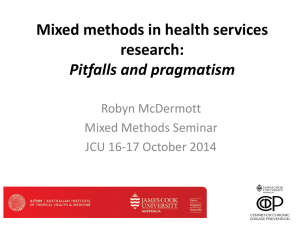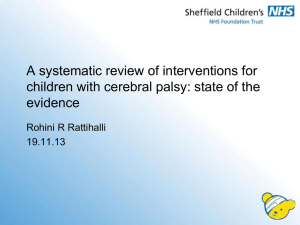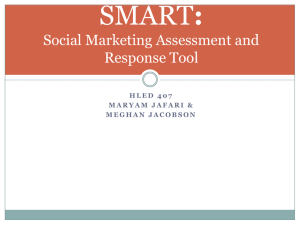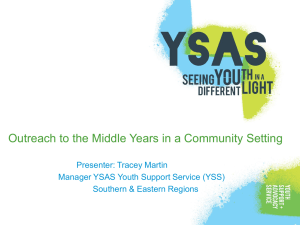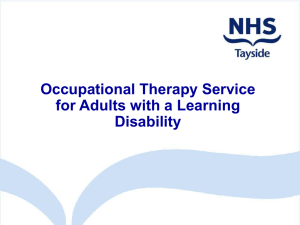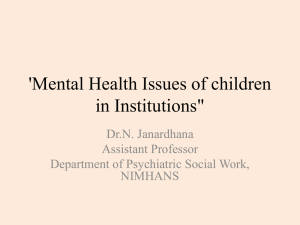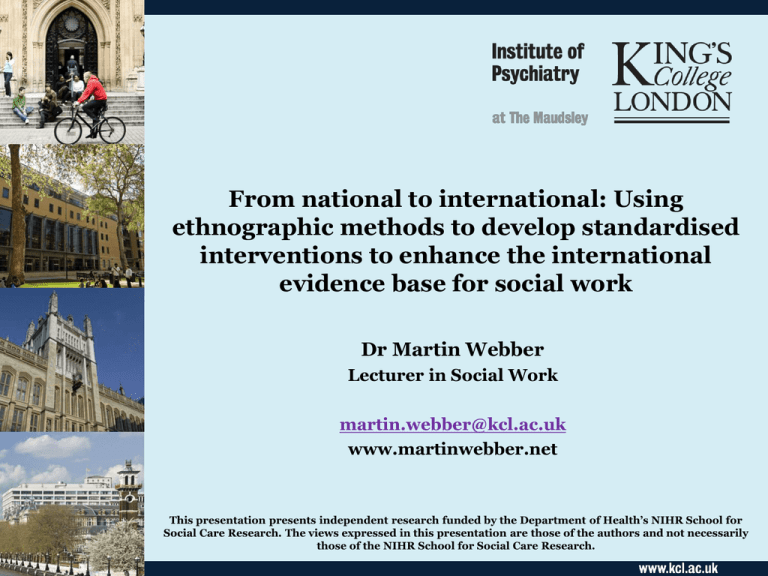
From national to international: Using
ethnographic methods to develop standardised
interventions to enhance the international
evidence base for social work
Dr Martin Webber
Lecturer in Social Work
martin.webber@kcl.ac.uk
www.martinwebber.net
This presentation presents independent research funded by the Department of Health’s NIHR School for
Social Care Research. The views expressed in this presentation are those of the authors and not necessarily
those of the NIHR School for Social Care Research.
Some questions
• Why do we need evidence-based interventions in social
work?
• How can ethnography be used to develop social
interventions?
– Connecting People Study
• How can this method be applied to the development of
an international evidence-base for social work?
Your answers
• Why do we need evidence-based interventions in social
work?
Intervention is at the heart of social work
Definition of Social Work:
The social work profession promotes social change, problem
solving in human relationships and the empowerment and
liberation of people to enhance well-being. Utilising theories of
human behaviour and social systems, social work intervenes at
the points where people interact with their environments.
Principles of human rights and social justice are fundamental to
social work. (IFSW Code of Ethics)
Poor public perception of social work
Only 1 out of 740 social workers agree that media coverage of
social work is “completely fair and accurate”
(The College of Social Work, 2012)
Could do better?
• Cohort study of 595 children investigated for suspected
maltreatment
• No change in social support, family functioning, poverty,
maternal education, or child behaviour problems following
intervention of child protection services
• Maternal depression worsened
Others define ‘our’ evidence base
• Reduced child behaviour problems and improved parenting
competencies
Others define ‘our’ evidence base
• Improved parenting skills in deprived area of inner London
But social workers can too…
• Social skills training and parenting intervention improves
children’s behaviour, decreases aggression and increases social
contact with peers
Social interventions
• Objections to RCTs of social interventions in the UK:
– Oversimplify causation
– Cannot test complex interventions
– Ignore the role of theory in understanding effectiveness
– Inappropriate where ‘blinding’ is impossible
– Politically unacceptable
– Too expensive
– Unethical because of withholding intervention from control
group and experimental research is exploitative
– Good alternatives to RCTs exist
(Oakley et al 2003)
RCTs in mental health services
Mental health social work
• Evidence-based practice in mental health settings
– Favours randomised controlled trial evidence
– Favours psychological and pharmacological interventions
– Struggles with complexity or ‘messy’ practice
• UK mental health services strongly influenced by EBP
– National Service Framework (now superseded, but still
influential)
– NICE clinical guidelines
• Mental health social work
– Reduced to bureau-medicalised roles and reliance on
statutory functions in absence of strong evidence base for
interventions (Nathan & Webber, 2010)
Social intervention development
Implementation
•Incidence and prevalence
•Explanatory knowledge
Effectiveness testing
•Practice knowledge
•Local knowledge
Efficacy testing
Intervention design
Modelling
Epidemiology
(Adapted from Fraser 2003)
Social interventions
• Greater impact on policy and practice if:
– High inner quality (robust, defensible, scientific validity)
– High outer quality (incorporate practice wisdom and values,
currency with practitioners) (Shaw & Norton 2008)
• Ethnography could improve outer quality of social
interventions and prepare them for RCT evaluation to
improve their inner quality
• Connecting People Study 2010-12: developing an
intervention to support people to increase their access
to social capital
Background
• Economic capital: Resources that can be used to produce financial
gains (Marx, 1867)
• Cultural capital: Information resources and socially valued assets,
e.g. knowledge of the arts, music or literature (Bourdieu, 1997)
• Human capital: Qualifications, training and work experience
(Becker 1964)
• Social capital: Sum of resources (actual or potential) that accrue to
a person or group from access to a network of relationships or
membership in a group (Bourdieu, 1997)
• Community capital: Combination of capitals within a defined area
or community, required to help people fulfil their potential (Hancock,
2001)
• Erotic capital: Beauty, sex appeal, charm, liveliness, presentation
(Hakim, 2010)
Background
• Wealth, power and status of network members can benefit
other individuals in that network (Lin 2001)
• Informal social networks are influential in helping unemployed
people find work (Perri 6 1997)
• Social capital helps reemployment (Sprengers et al 1988) and
has an effect on income (Boxman et al 1991)
• Social capital is positively associated with current occupational
status (Flap & Volker 2001)
• Social capital can lead to greater occupational prestige, income
and political influence when mobilised (Lin & Erickson 2008)
Background
Access to social capital
20
18
16
14
12
10
8
6
4
2
0
General
population
People with
depression
(primary
care)
People with
SMI
(secondary
care)
Punjabi
women with
SMI
Volunteers
with SMI
Aims
• To understand the ways in which workers are currently helping
young people recovering from psychosis to generate and
mobilise social capital
• To investigate how workers develop effective working
relationships and secure attachments with service users, and
thereby promote their social engagement
• To develop an applied social capital theory for mental health
social care practice in the UK and beyond
• To develop social capital interventions that can be used by
workers in their everyday practice
Method
• Combinative ethnography of social care practice
– Semi-structured interviews, observations of practice and
focus groups
– Exploratory, not evaluative
• Setting
– NHS mental health services (mental health professionals and
support time & recovery workers in early intervention in
psychosis teams, social inclusion and recovery services)
– Housing support (supported housing & floating support
workers)
– Third sector (social enterprises, voluntary organisations)
• Sample
– 145 workers, service users, managers, commissioners (so far)
Method
• Ethnography phase 1
– Agencies identify workers likely to be effective at enhancing
service users’ social capital
– Researcher interviews workers to discuss their practice
– Researcher observes practice, particularly with new service
users, and interviews service users and carers about their
experience
– This process is repeated with different workers, or in
different settings within the agency, to obtain full data
– This process will be repeated in each of the agencies and
teams as an iterative approach
– Focus groups of service users, carers and workers to discuss
emerging findings
Method
• Ethnography phase 2:
– Additional workers not interviewed in phase 1 are identified
by the agencies and researchers
– Researcher interviews workers to discuss and conceptualise
their practice
– Researcher observers practice and interviews service users
and carers about their experience
– Researcher also interviews a sample of service users from
phase 1 to reflect on changes for them since then
– New questions emerging from phase 1, or areas of practice
previously unobserved, is the focus of phase 2
– Focus groups of service users, carers and workers to discuss
emerging intervention model
Method
• Delphi Consultation (starting in April):
– Intervention is developed in liaison with project’s advisory
group (incorporating service users, carers, practitioners and
researchers)
– Intervention is revised using a Delphi consultation method
using advisory group and a wider group of stakeholders
(including practitioners, managers and service users)
– Delphi consultation will ask for feedback on fidelity of
interventions to social capital theory; adequacy, clarity and
comprehensiveness of the practice guidelines; and feasibility
and accessibility of interventions in practice
– Two rounds of ratings plus qualitative feedback will help us
to refine intervention and make it fit for purpose
Findings
Reducing power differentials works
“They’re trying new things as well so you’re on an even field” (service user)
“…it creates a level playing field for them because it takes the pressure off them to
deliver and they can just, really, buddy up with the guys and take part in the
activities” (worker)
Findings
Non-stigmatised locations bring people together
“I remember working with a young lad in Dartford who did not want to come onto the
Charlton project because he didn’t want to be around people with mental health
problems” (worker)
Findings
Local knowledge is essential
“But I, you know, we’ll sort of ask each other on the team, ‘Oh does anyone know of a
place where so-and-so can volunteer’ or whatever” (worker)
Findings
Connections occur through shared activities
“They’ve suggested it on their…sheet and we’ve matched it up with five others who have
said that they want to do that [activity]” (worker)
“But I think that they sort of felt that I, I play guitar, I was a singer in a band, sort of
have got a lot of sport interests, sort of like a lot of different things and I think that they
felt that perhaps some of the people there are harder to engage. And because I might
have more in common with them…” (worker)
Findings
Focus on an individual’s goals
“…the way they’ve helped me connect with things… like going to college, that will stay
with me forever. Because I’ll get an education…” (service user)
Findings
Informal contacts provide access to resources
“Well my mate goes there and she rung me up and told me about it because she knew I
needed maths and English. So I rung the key skills and got an interview and then they
said that I could go through.” (service user)
Findings
Social capital is not a panacea
“Because even though I’ve got friends to hang around with, some of them are not
very good friends. Some of them drink, drugs, and even though I drink the odd time,
but, they do drugs and you know, it’s just sort of like, they’re wrong ones, do you
know what I mean? And I want to hang around with decent people who want to get
their life on track and not destroy their life”. (service user)
Partnership
Worker
Developing
skills,
relationships
and resources
with this
individual and
for the future
Equality
Shared
processes
Social
Network
Knowledge
Development
Individual
Developing
ideas, goals,
and
confidence
Potential
Potential and working
barriers
barriers to attain and
expand on
these
Social
Network
Development
Agency
Intervention guidance
International evidence
Crowther et al. (2001) British Medical
Journal, 322 : 204-208
International evidence
Assertive Community Treatment (ACT)
1998: Cochrane review
of ACT published
Successive UK trials of
found no positive effect
of ACT vs. usual care
(e.g. Burns et al 1999,
Killaspy et al 2006)
1999: 10-year plan for UK
mental health services
published (National Service
Framework for Mental Health)
and advocates introduction of
ACT in UK
ACT teams in the
UK begin to be decommissioned
Reviews of UK evidence
suggest usual care is as
good as ACT (e.g. Burns
2010)
International evidence
• Ethnography can provide
– A rich understanding of local context
– An insight into practice
– An insight into intervention processes
– An understanding of how theory can be applied to practice
– An understanding of the difference between reality and
rhetoric
– Reasons why intervention A does not work in context Z
• Used at the intervention development stage,
ethnography may be able to effectively translate theory
into practice into different contexts
Malawi
• 9 pilot interviews (4 nurses, 5 social workers)
– Qualified for an average of 6 years
– Explored practitioner’s understanding of social capital in the
context of their practice
• Good communication and trust is essential to building
relationships
• Most don’t see developing inter-personal relationships
as part of their role
• But, over half foster contacts with ‘resourceful’ people
• Resourcefulness:
– Ability to deal with new situations
– Ability to identify needs to satisfy ones own requirements
India
• Interviews with 15 psychiatric social workers
– Qualified for an average of 17 years
• Family is the predominant source of social capital
• Social security provided by NGOs
– Linkages between NGOs are poor
– Don’t refer people to other NGOs for fear of losing clients
– More clients + more programmes = more income
– Develop service around clients
• But social workers advise people about services
available beyond their agency (if they can’t provide it)
• Resourcefulness:
– Material resources within the community
Limitations
• Lack of resources
– No research grant and time is prioritised elsewhere
• Limited expertise in research methodology
– How do we enhance reliability of data collection?
• Local risks
– Computer and voice recorder stolen by armed gang in
Malawi
• No more than pilot data at this stage
• Exploration is limited to two low & middle income
countries
– Do concepts translate across Europe?
Next steps (2012-14)
• Adapt Connecting People Intervention for use with
adults with a learning disability and older adults with
mental health problems
• Develop measure of fidelity to intervention
• Quasi-experimental study to pilot intervention
– Involving 12 agencies and 240 people
– Follow-up over 12 months to evaluate outcomes and costeffectiveness
• Prepare for a randomised controlled trial
• Prepare grant application for international study:
Collaborators sought
Thank you
Please do not hesitate to contact me for further
information:
martin.webber@kcl.ac.uk
martinwebber.net
(+44) 20 7848 5096
Acknowledgements:
NIHR School for Social Care Research
David Ansari, Hannah Reidy & Meredith Newlin (Researchers)
David Morris & Polly Kaiser (University of Central Lancashire)
Paul McCrone & Martin Stevens (King’s College London)
Peter Bates (National Development Team for Inclusion)

